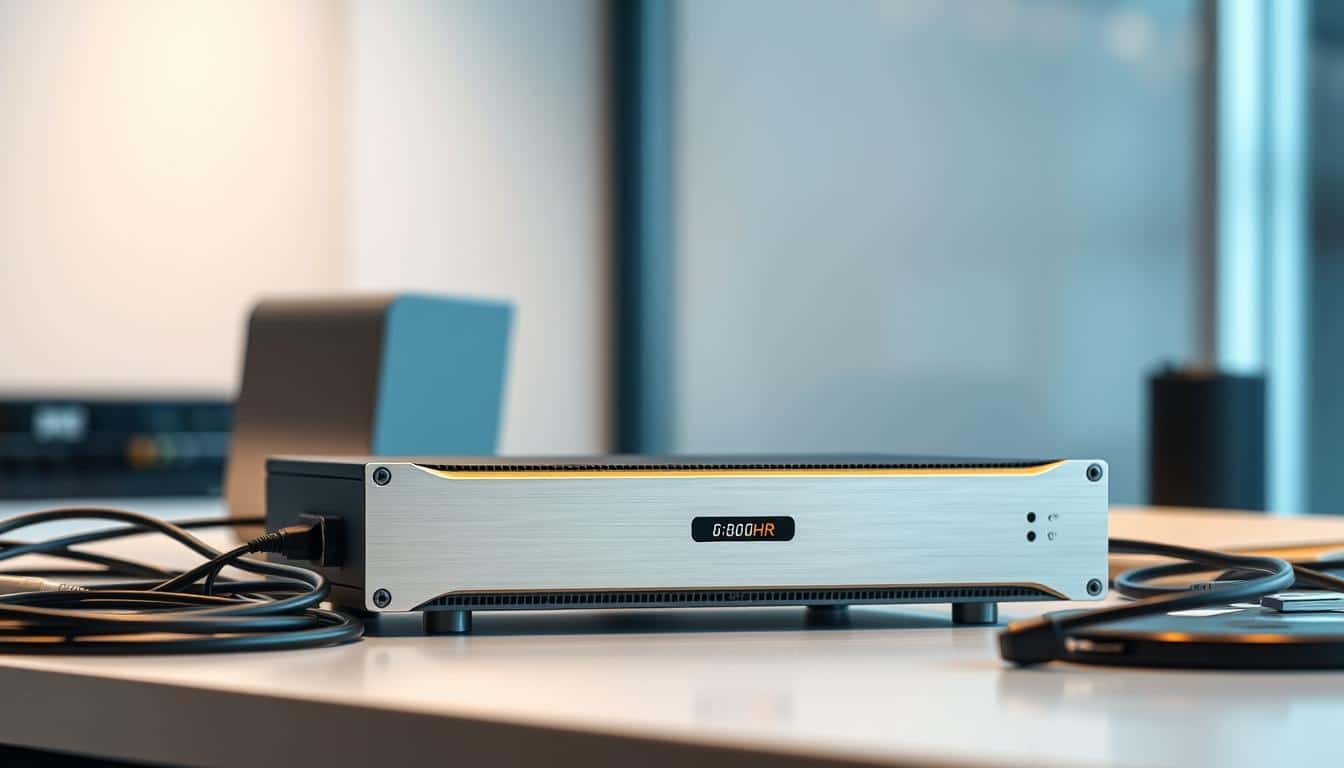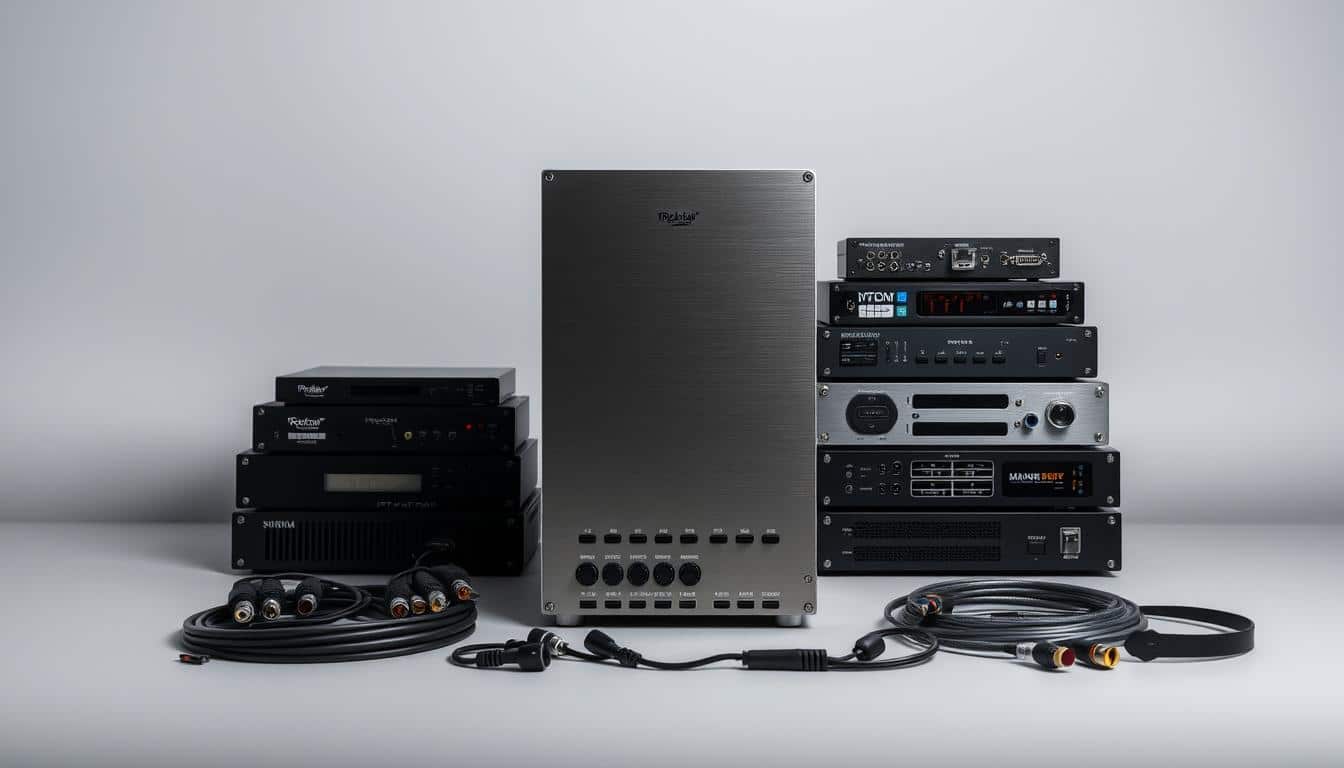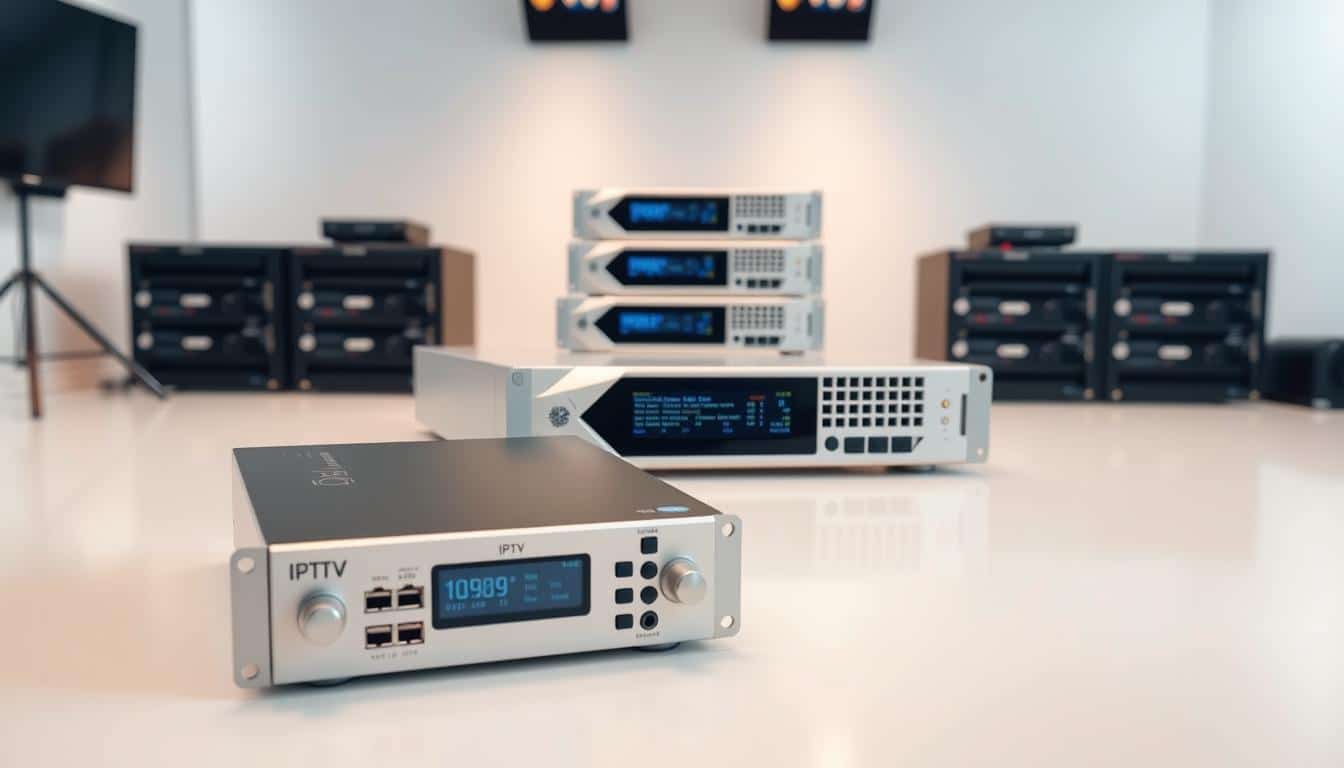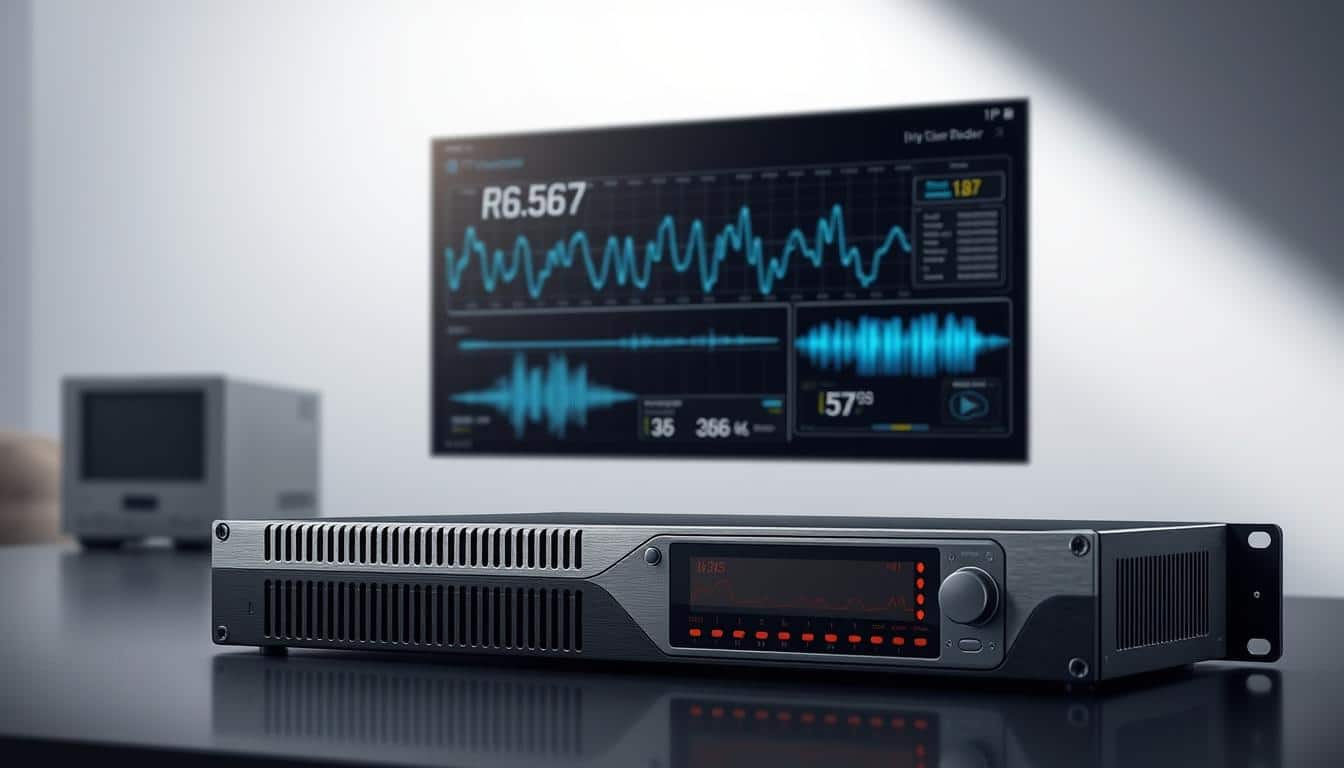Are you tired of buffering and poor video quality during your favorite shows? The secret to a seamless streaming experience lies in the quality of your IPTV encoder.
iptv encoder encoders play a crucial role in delivering high-quality video content. By converting video signals into a digital format, these encoders enable smooth streaming over the internet.

The right IPTV encoder features can significantly enhance your viewing experience, offering features like high-definition video, low latency, and compatibility with various streaming platforms.
Table of Contents
Key Takeaways
- Top-rated IPTV encoders improve streaming quality.
- IPTV encoders convert video signals for digital streaming.
- Key features include HD video and low latency.
- Compatibility with various streaming platforms is crucial.
- Enhance your viewing experience with the right encoder.
The Fundamentals of IPTV Streaming Technology
IPTV represents a paradigm shift in content delivery, moving away from traditional methods. This shift is driven by advancements in internet technology and changing viewer preferences.

How IPTV Differs from Traditional Broadcasting
Unlike traditional broadcasting, IPTV delivers content over internet protocol networks, allowing for greater flexibility and personalization. This method enables viewers to watch content on-demand, rather than adhering to a fixed broadcast schedule.
IPTV also supports multicast streaming, where a single stream can be sent to multiple viewers simultaneously, making it efficient for live events.
The Evolution of IPTV Technology
The evolution of IPTV technology has been marked by significant advancements in iptv encoder encoders and iptv hardware encoder capabilities. Modern encoders are capable of handling high-quality video streams, ensuring a superior viewing experience.
When comparing different iptv encoder comparison models, factors such as compression standards, input/output options, and scalability become crucial. These elements play a significant role in determining the quality of the IPTV service.
Understanding IPTV Encoder Encoders and Their Importance
In the realm of IPTV, encoders serve as the backbone, ensuring that content is delivered efficiently and effectively. IPTV encoders are specialized devices or software designed to encode raw video and audio signals into a digital format suitable for streaming over the internet.
What Are IPTV Encoders and How Do They Work?
IPTV encoders take raw video and audio inputs and compress them into digital formats such as H.264 or H.265/HEVC. This compression process reduces the file size, making it easier to stream over various bandwidths without compromising quality. Professional IPTV encoders are equipped with advanced compression algorithms and error correction capabilities to ensure a smooth viewing experience.

The Critical Role of Encoders in Content Delivery
The role of IPTV encoders in content delivery is multifaceted. They not only compress video and audio but also prepare the content for streaming by encapsulating it into IP packets. This process enables content providers to reach a wider audience across different devices and platforms. Efficient encoding is crucial for maintaining the integrity of the content and ensuring it is delivered in real-time.
Impact on Video Quality and Viewer Experience
The quality of the IPTV encoder directly impacts the video quality and overall viewer experience. A high-quality encoder ensures that the video is streamed with minimal latency and buffering, providing a seamless viewing experience. Reviews of IPTV encoders often highlight the importance of selecting a device or software that can handle the demands of high-definition streaming.
In conclusion, IPTV encoders are vital components in the streaming ecosystem, playing a critical role in content delivery and viewer experience. Understanding their importance and functionality is key to optimizing IPTV services.
Key Features to Look for in Top-Rated IPTV Encoders
When selecting an IPTV encoder, it’s crucial to consider several key features that can significantly impact your streaming quality. The right encoder can enhance your content delivery, providing a better viewer experience.
Video Compression Standards (H.264, H.265/HEVC, AV1)
A top-rated IPTV encoder should support the latest video compression standards, including H.264, H.265/HEVC, and AV1. These standards offer varying levels of compression efficiency and video quality. For instance, H.265/HEVC provides a significant reduction in bitrate while maintaining high video quality, making it ideal for 4K and high-definition streaming.

Input/Output Options and Connectivity
The best IPTV encoders offer versatile input/output options and connectivity to accommodate different sources and streaming requirements. Look for encoders with HDMI, SDI, and audio inputs to connect various devices, including cameras, game consoles, and audio mixers.
Scalability and Multi-Channel Support
Scalability is a critical feature, especially for businesses or platforms anticipating growth. A top IPTV encoder should be able to handle multiple channels and be easily scalable to meet increasing demands. This feature ensures that your encoder can grow with your business.
Latency Management Capabilities
Low latency is essential for real-time streaming and interactive applications. The best IPTV encoders provide advanced latency management capabilities, ensuring that your stream is delivered with minimal delay. This is particularly important for live events and sports broadcasting.
By focusing on these key features, you can identify a top-rated IPTV encoder that meets your streaming needs and enhances your overall content delivery.
Hardware vs. Software IPTV Encoders: Making the Right Choice
The debate between hardware and software IPTV encoders centers around performance, flexibility, and cost, each having its unique advantages. When deciding on an IPTV encoder, understanding these differences is crucial for optimizing your streaming service.
Reliability and Performance Benefits
Hardware IPTV encoders are known for their reliability and performance. They are dedicated devices designed specifically for encoding video streams, offering consistent and high-quality output. Hardware encoders are less prone to compatibility issues and can handle demanding encoding tasks without the risk of system crashes.
A notable example is the Haivision Makito X4, a robust hardware encoder praised for its broadcast-quality streaming capabilities. According to a review, “The Makito X4 delivers exceptional video quality, making it ideal for professional broadcasters.”
“The Makito X4’s ability to encode and stream in multiple formats simultaneously is a game-changer for live events.”
| Feature | Hardware Encoders | Software Encoders |
|---|---|---|
| Performance | High, dedicated hardware | Variable, dependent on CPU |
| Cost | Generally higher upfront cost | Can be more cost-effective, especially for small-scale operations |
| Flexibility | Limited flexibility, designed for specific tasks | Highly flexible, can be updated or modified |
Flexibility and Cost-Effectiveness
Software IPTV encoders, on the other hand, offer flexibility and can be a cost-effective solution. They run on standard computer hardware, making them adaptable to various configurations and potentially lowering the initial investment. Software encoders can be easily updated to support new codecs or features, extending their lifespan.
For instance, software encoders like Telestream Wirecast are popular among smaller broadcasters for their ease of use and affordability. As noted, “Wirecast Pro offers a user-friendly interface and robust features, making it a favorite among streamers.”
Hybrid Solutions for Maximum Versatility
For those seeking the best of both worlds, hybrid solutions are available. These combine the reliability of hardware with the flexibility of software. Hybrid IPTV encoders can offer the performance of dedicated hardware while allowing for software updates and adjustments.
By understanding the strengths and weaknesses of hardware and software IPTV encoders, broadcasters can make informed decisions that meet their specific needs, balancing performance, cost, and flexibility.
Professional IPTV Encoder Encoders for Broadcast-Quality Streaming
To achieve broadcast-quality streaming, content providers turn to advanced iptv encoder encoders that offer superior performance and flexibility. These professional-grade encoders are designed to handle the demands of high-quality video streaming, ensuring a seamless viewing experience for audiences.
Haivision Makito X4
The Haivision Makito X4 is a high-performance iptv encoder encoders designed for broadcast and professional AV applications. It offers advanced video encoding capabilities, including support for 4K and HDR content.
Key Specifications and Performance
- Supports H.264 and H.265/HEVC encoding
- 4K and HDR capability
- Low latency for real-time streaming
- Robust streaming protocols for reliability
Ideal Use Cases and Applications
The Makito X4 is ideal for broadcasters, sports organizations, and enterprises that require high-quality, low-latency streaming. It’s suitable for live events, news gathering, and other applications where video quality and reliability are paramount.
VITEC MGW Ace
The VITEC MGW Ace is a versatile and powerful iptv encoder encoders that offers advanced streaming capabilities. It’s designed for both live and on-demand streaming applications.
Key Specifications and Performance
| Feature | Specification |
|---|---|
| Video Encoding | H.264, H.265/HEVC |
| Input Options | SDI, HDMI, IP |
| Streaming Protocols | RTP, RTSP, SRT |
Ideal Use Cases and Applications
The VITEC MGW Ace is suitable for a wide range of applications, including live events, sports broadcasting, and corporate communications. Its flexibility and performance make it an excellent choice for organizations seeking high-quality IPTV streaming solutions.
Wowza ClearCaster
The Wowza ClearCaster is a hardware encoder designed for live streaming applications. It offers high-quality video encoding and streaming capabilities, making it suitable for professional broadcast environments.
Key Specifications and Performance
- Supports 1080p and 4K resolutions
- H.264 encoding
- Low latency streaming
- Multi-streaming capabilities
Ideal Use Cases and Applications
The Wowza ClearCaster is ideal for content creators, broadcasters, and organizations that require high-quality live streaming. It’s suitable for applications such as live events, webinars, and social media streaming.
In conclusion, these professional iptv encoder encoders offer broadcast-quality streaming capabilities, making them ideal for organizations that require high-quality video content delivery. When selecting an IPTV encoder, consider factors such as video quality, latency, and streaming protocols to ensure the best possible viewing experience for your audience.
Best Affordable iptv encoder encoders for Small Broadcasters
The quest for quality IPTV encoding doesn’t have to break the bank, as several affordable encoders cater to small broadcasters. These encoders offer a balance between cost and performance, enabling small broadcasters to deliver high-quality content to their audiences.
Teradek Vidiu Pro
The Teradek Vidiu Pro is a highly regarded iptv encoder encoders known for its robust performance and user-friendly interface. It supports 4K UHD encoding and offers advanced HEVC (H.265) compression, making it an excellent choice for high-quality streaming.
Features and Real-World Performance
The Vidiu Pro boasts dual SDI and HDMI inputs, allowing for flexible connectivity options. Its real-world performance is commendable, with low latency and high video quality. It also supports RTMP, RTSP, and SRT protocols, ensuring compatibility with various streaming platforms.
Value Proposition and Limitations
The Teradek Vidiu Pro offers excellent value for its price, given its high-performance capabilities. However, its cost may still be prohibitive for very small operations. Additionally, some users may find the setup process to be complex.
Epiphan Pearl Mini
The Epiphan Pearl Mini is another affordable iptv encoder encoders that packs a punch with its feature set. It is designed for high-quality video capture and streaming, making it suitable for various broadcasting needs.
Features and Real-World Performance
This encoder features dual HDMI inputs and supports 4K UHD encoding. Its performance is characterized by low latency and high-quality video output. The device is also known for its compact and portable design, making it ideal for on-the-go broadcasting.
Value Proposition and Limitations
The Epiphan Pearl Mini is valued for its flexibility and performance. While it is generally affordable, the cost can add up with additional features and configurations. Some users have noted that the user interface could be more intuitive.
AJA HELO
The AJA HELO is a versatile iptv encoder encoders that offers high-quality streaming capabilities. It is designed to be user-friendly while providing advanced features for professional broadcasting.
Features and Real-World Performance
The HELO supports HDMI input and offers HEVC (H.265) encoding, ensuring efficient streaming. Its real-world performance includes low latency and reliable connectivity. The device is also known for its easy integration with popular streaming platforms.
Value Proposition and Limitations
The AJA HELO is appreciated for its ease of use and robust feature set. While it is generally priced affordably, some advanced features may require additional configuration. The device’s compact design is also a plus for users with limited space.
When choosing an affordable iptv encoder encoders, small broadcasters should consider their specific needs, including video quality, latency, and connectivity options. The Teradek Vidiu Pro, Epiphan Pearl Mini, and AJA HELO are all viable options that balance cost and performance.
| Encoder Model | Video Resolution | Latency | Price Range |
|---|---|---|---|
| Teradek Vidiu Pro | 4K UHD | Low | $1,000 – $1,500 |
| Epiphan Pearl Mini | 4K UHD | Low | $800 – $1,200 |
| AJA HELO | 1080p/4K | Low | $600 – $1,000 |
High-Quality iptv encoder encoders for Enterprise Solutions
High-quality iptv encoder encoders are the backbone of enterprise streaming operations, providing the necessary infrastructure for seamless content delivery. Enterprises require robust encoders that can handle complex broadcasting needs, ensuring that their IPTV services are delivered with utmost clarity and reliability.
Several top-tier iptv encoder encoders are designed to meet the demands of enterprise solutions. Let’s explore some of the most notable options:
AWS Elemental Live
AWS Elemental Live is a cloud-based live video processing service that enables users to create high-quality, live video streams. It offers advanced features such as real-time video processing, content protection, and ad insertion, making it an ideal choice for enterprises looking to enhance their IPTV streaming capabilities.
Harmonic VOS360 Platform
The Harmonic VOS360 Platform is a comprehensive video processing and delivery solution designed for service providers and enterprises. It offers advanced video encoding, transcoding, and streaming capabilities, ensuring that content is delivered with high quality and reliability.
Telestream Wirecast Pro
Telestream Wirecast Pro is a professional live video production and streaming software that offers advanced features such as multi-camera support, real-time titling, and streaming to multiple platforms. It’s an excellent choice for enterprises looking to produce high-quality live content.
Blackmagic Design ATEM Mini Pro
Blackmagic Design ATEM Mini Pro is a compact and powerful live production switcher that offers advanced features such as multi-camera support, chroma keying, and streaming capabilities. It’s an ideal solution for enterprises looking to produce high-quality live content with ease.
Here’s a comparison of these high-quality iptv encoder encoders:
| Encoder | Key Features | Scalability | Video Quality |
|---|---|---|---|
| AWS Elemental Live | Cloud-based, real-time processing, content protection | Highly scalable | 4K, HDR support |
| Harmonic VOS360 Platform | Comprehensive video processing, advanced encoding | Scalable | 4K, UHD support |
| Telestream Wirecast Pro | Multi-camera support, real-time titling, multi-platform streaming | Flexible | 4K, 60fps support |
| Blackmagic Design ATEM Mini Pro | Multi-camera support, chroma keying, streaming capabilities | Compact, portable | 4K, HDR support |
When selecting an iptv encoder encoders for enterprise solutions, it’s essential to consider factors such as scalability, video quality, and key features that align with your specific needs. By choosing the right encoder, enterprises can ensure that their IPTV services are delivered with high quality and reliability.
Setting Up Your iptv encoder encoders for Optimal Performance
Properly setting up your iptv encoder encoders is the first step towards achieving superior streaming quality. A well-configured encoder ensures that your content is delivered efficiently and effectively, meeting the expectations of your viewers.
Initial Configuration Best Practices
When configuring your IPTV encoder, start by selecting the appropriate video compression standards. H.264 and H.265/HEVC are widely used for their balance between quality and file size. Ensure your encoder supports these standards to maintain compatibility with various devices.
- Choose the right input/output options based on your equipment.
- Configure the encoder to match your network’s bandwidth capabilities.
- Set the appropriate streaming protocols (e.g., RTMP, SRT, or RTSP).
Optimizing Encoding Settings for Different Content Types
Different content types require specific encoding settings. For instance, live sports events demand low latency, while movie streaming can tolerate slightly higher latency for better quality. Adjust your encoder settings accordingly to optimize performance.
| Content Type | Recommended Encoding Setting |
|---|---|
| Live Sports | Low Latency (H.264) |
| Movies | High Quality (H.265/HEVC) |
Monitoring and Maintenance Tips
Regular monitoring is crucial to ensure your iptv encoder encoders operates smoothly. Check for firmware updates, monitor system logs, and perform routine maintenance tasks to prevent issues.
Integration with Content Delivery Networks (CDNs)
Integrating your iptv encoder encoders with CDNs can significantly enhance your streaming performance. CDNs distribute your content across multiple servers, reducing latency and improving viewer experience. When selecting a CDN, consider factors like coverage area, server reliability, and cost.
Troubleshooting Common iptv encoder encoders Challenges
Troubleshooting iptv encoder encoders issues is crucial for maintaining high-quality video streaming. IPTV encoders play a vital role in delivering content to viewers, and when they malfunction, it can lead to a range of problems.
Resolving Latency and Buffering Issues
Latency and buffering are common issues that can significantly impact the viewer experience. To resolve these problems, it’s essential to check the encoder’s configuration and ensure that it’s optimized for the specific streaming requirements. Adjusting the bitrate and resolution can also help alleviate buffering issues.
Addressing Quality Degradation Problems
Quality degradation can occur due to various factors, including hardware limitations or software configuration. To address these issues, it’s crucial to monitor the encoder’s performance regularly and adjust settings as needed. Comparing different iptv encoder encoders can also help identify the most suitable solution for specific needs.
Fixing Connectivity and Network Bottlenecks
Connectivity and network bottlenecks can cause significant disruptions to IPTV streaming. To fix these issues, it’s essential to assess the network infrastructure and ensure that it can handle the required bandwidth. Upgrading to a more robust iptv hardware encoder can also help alleviate connectivity problems.
Managing Audio Sync and Multistream Complexities
Audio sync issues and multistream complexities can be challenging to manage. To address these problems, it’s crucial to configure the encoder correctly and ensure that audio and video streams are properly synchronized. Utilizing an iptv encoder comparison can help identify the most suitable encoder for managing complex streaming requirements.
Conclusion: Selecting the Perfect iptv encoder encoders for Your Streaming Needs
Choosing the right iptv encoder encoders is crucial for delivering high-quality streaming experiences. With various options available, from top-rated iptv encoders to professional iptv encoders, understanding the key iptv encoder features is essential.
When selecting an iptv encoder encoders, consider factors such as video compression standards, input/output options, and scalability. Top-rated encoders like Haivision Makito X4 and VITEC MGW Ace offer advanced features that cater to different streaming needs.
A professional iptv encoder can significantly enhance your IPTV experience by providing broadcast-quality streaming, low latency, and reliable performance. By evaluating your specific requirements and exploring the available options, you can find the perfect encoder to meet your streaming goals.
FAQ
What is an IPTV encoder, and how does it work?
An iptv encoder encoders is a device or software that converts video and audio signals into a digital format suitable for streaming over the internet. It works by compressing the video and audio data using various compression standards like H.264 or H.265, and then packaging it into IP packets for transmission.
What are the key features to look for in a top-rated IPTV encoder?
When selecting an iptv encoder encoders,; look for features such as support for multiple video compression standards, input/output options like HDMI or SDI, scalability for multi-channel support, and latency management capabilities to ensure a high-quality streaming experience.
What is the difference between hardware and software iptv encoder encoders?
Hardware IPTV encoders are dedicated devices that provide reliable performance and are often used in professional broadcasting environments. Software IPTV encoders, on the other hand, run on standard computer hardware and offer flexibility and cost-effectiveness. Hybrid solutions combine the benefits of both.
How do I choose the best IPTV encoder for my streaming needs?
To choose the best IPTV encoder, consider your specific streaming requirements, such as the type of content, desired video quality, and the number of channels you need to stream. Research different models, read reviews, and compare features to find the one that best fits your needs and budget.
What are some common challenges faced by iptv encoder encoders users, and how can they be resolved?
Common challenges include latency, quality degradation, connectivity issues, and audio sync problems. To resolve these, ensure proper configuration, optimize encoding settings, monitor performance, and integrate with Content Delivery Networks (CDNs) to minimize latency and improve overall streaming quality.
Can I use an iptv encoder encoders for live streaming and VOD content?
Yes, iptv encoder encoders can be used for both live streaming and Video-on-Demand (VOD) content. For live streaming, the encoder converts the live feed into a digital format, while for VOD, it can be used to encode pre-recorded content for streaming.
How do IPTV encoders impact video quality and viewer experience?
IPTV encoders play a crucial role in determining video quality by compressing the video signal to a suitable bitrate for streaming. A high-quality encoder can maintain a good balance between compression efficiency and video quality, ensuring a smooth and enjoyable viewer experience.
Are there any affordable IPTV encoders suitable for small broadcasters?
Yes, there are affordable IPTV encoders available, such as the Teradek Vidiu Pro, Epiphan Pearl Mini, and AJA HELO, which offer a balance between price and performance, making them suitable for small broadcasters and streaming professionals.

